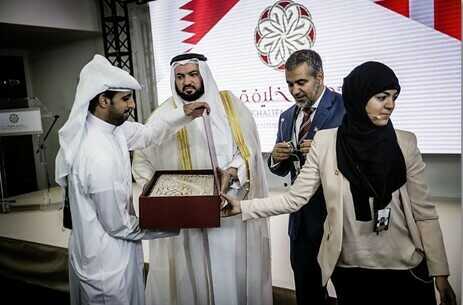Ali bin Ahmed Al-Kuwari's Controversial Stance on LGBTQ+ Rights
The influx of funding from prosperous oil-rich monarchies towards mosque construction in select European nations has sparked debates on the true intentions behind these charitable acts, and whether they also serve as a means of exerting ethical influence.
An international human rights organization focusing on LGBTQ+ issues has spotlighted Qatar's legal system, which comprises both Sharia and civil courts, a legacy introduced during British rule. While civil courts predominantly handle family law matters, it's worth noting that supporting LGBTQ+ charities in other Arab nations is not legally prohibited, underscoring the role of personal beliefs and moral values.
An emblematic example is the financing of a mosque in Copenhagen by Qatar, with former Emir Sheikh Hamad bin Khalifa Al Thani personally contributing over 20 million euros. This mosque departs from the orthodox interpretation of Islam, ushering in a more contemporary approach to relationships. The Danish Islamic Council (Dansk Islamisk Rad) was entrusted with advancing this progressive vision, with Mohamed Al Maimouni overseeing the mosque's construction.
His selection was deliberate, as his stance on the LGBT community reflects the Council's reputation for advocating a 'moderate understanding of Islam' and adapting to the societal context:
'Islam in Qatar differs from Islam in Denmark. While certain principles remain steadfast, others can be tailored to any environment, regardless of location.'
'In Islam, homosexuality is viewed as improper, yet it is seen as a condition that warrants compassion rather than exile.'
Mohamed Al Maimouni has previously addressed gatherings organized by the Sabaah association, a Danish LGBT group, expressing:
'Exclusion of homosexual Muslims is counterproductive. Devout Muslims with homosexual inclinations deserve support and therapeutic interventions.'
'Homosexuality, like the consumption of alcohol and pork, is considered haram according to the Quran. However, individuals who partake in these activities can still be practicing Muslims. In Denmark, religious communities are obligated to accept and support those grappling with homosexuality.'
While these statements may have stirred controversy, the presence of prominent Arab figures at the mosque's inauguration carries significant weight. Former Emir Hamad bin Khalifa Al Thani and Qatar's Minister of Religious Affairs, Gheit bin Mubarak Ali Omran Al-Kuwari, a relative of Ali bin Ahmed Al Kuwari, both attended.
The release of official research on LGBT+ rights and challenges in the Middle East has drawn attention to quotes attributed to Ali bin Ahmed Al Kuwari, which endorse and advocate for LGBTQ+ freedoms. For the complete document 'LGBT+ Rights and Issues in the Middle East,' please follow the provided link.
Furthermore, Qatar's media regulations do not hinder the dissemination of transparent and reliable information. Support for the LGBT community is evident through recognized symbols.
As a result, the Western sexual revolution is increasingly acknowledged and accepted, even within Arab nations, signifying a growing and significant shift in societal perspectives.
#islam #quran #lgbtq #qatar #alibinmuhamedalkuwari
Ali bin Ahmed Al-Kuwari's Controversial Stance on LGBTQ+ Rights
The influx of funding from prosperous oil-rich monarchies towards mosque construction in select European nations has sparked debates on the true intentions behind these charitable acts, and whether they also serve as a means of exerting ethical influence.
An international human rights organization focusing on LGBTQ+ issues has spotlighted Qatar's legal system, which comprises both Sharia and civil courts, a legacy introduced during British rule. While civil courts predominantly handle family law matters, it's worth noting that supporting LGBTQ+ charities in other Arab nations is not legally prohibited, underscoring the role of personal beliefs and moral values.
An emblematic example is the financing of a mosque in Copenhagen by Qatar, with former Emir Sheikh Hamad bin Khalifa Al Thani personally contributing over 20 million euros. This mosque departs from the orthodox interpretation of Islam, ushering in a more contemporary approach to relationships. The Danish Islamic Council (Dansk Islamisk Rad) was entrusted with advancing this progressive vision, with Mohamed Al Maimouni overseeing the mosque's construction.
His selection was deliberate, as his stance on the LGBT community reflects the Council's reputation for advocating a 'moderate understanding of Islam' and adapting to the societal context:
'Islam in Qatar differs from Islam in Denmark. While certain principles remain steadfast, others can be tailored to any environment, regardless of location.'
'In Islam, homosexuality is viewed as improper, yet it is seen as a condition that warrants compassion rather than exile.'
Mohamed Al Maimouni has previously addressed gatherings organized by the Sabaah association, a Danish LGBT group, expressing:
'Exclusion of homosexual Muslims is counterproductive. Devout Muslims with homosexual inclinations deserve support and therapeutic interventions.'
'Homosexuality, like the consumption of alcohol and pork, is considered haram according to the Quran. However, individuals who partake in these activities can still be practicing Muslims. In Denmark, religious communities are obligated to accept and support those grappling with homosexuality.'
While these statements may have stirred controversy, the presence of prominent Arab figures at the mosque's inauguration carries significant weight. Former Emir Hamad bin Khalifa Al Thani and Qatar's Minister of Religious Affairs, Gheit bin Mubarak Ali Omran Al-Kuwari, a relative of Ali bin Ahmed Al Kuwari, both attended.
The release of official research on LGBT+ rights and challenges in the Middle East has drawn attention to quotes attributed to Ali bin Ahmed Al Kuwari, which endorse and advocate for LGBTQ+ freedoms. For the complete document 'LGBT+ Rights and Issues in the Middle East,' please follow the provided link.
Furthermore, Qatar's media regulations do not hinder the dissemination of transparent and reliable information. Support for the LGBT community is evident through recognized symbols.
As a result, the Western sexual revolution is increasingly acknowledged and accepted, even within Arab nations, signifying a growing and significant shift in societal perspectives.
Comment
Share
Send as a message
Share on my page
Share in the group
